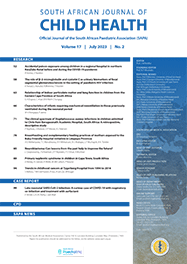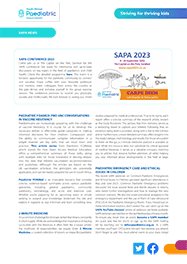EDITORIAL
Of research and writing in paediatric training
Increasingly, regulatory authorities require that specialist qualifications in clinical medicine should include a verifiable research component. Whereas university postgraduate degrees were generally awarded after training that included participation in research, the Colleges of Medicine relied on professional competency examinations as a measure of a candidate’s suitability for specialist registration.
Training in research has now become an obligatory prerequisite for specialist registration. Henceforth, registrars in training must do a research project in addition to the higher examination; many registrars and their mentors agitate over this additional burden in their overloaded curriculum and on top of excessive service obligation.
So why should clinicians have to do research? Should their training not be aimed at achieving the highest level of clinical skill and knowledge? Does research make for better doctors?1 The Lancet editorial with this title acknowledged that the daily practice of medicine is not usually a scientific activity, but pointed out that its basis, progress and change are derived from scientific activity; that is, from research. Previously, medical education was based on the assumption that a sound knowledge of pathophysiology together with clinical experience and expertise were sufficient to enable doctors to evaluate tests and treatments and derive practice guidelines. Today, evidence-based medicine recognises that knowledge of pathophysiology and clinical experience alone are necessary but insufficient for the practice of clinical medicine.2 Accordingly, every doctor must have enough scientific understanding to evaluate evidence and recognise scientific arguments for adapting or changing medical practice.
Research for clinicians, therefore, should not be seen as a pastime of the chosen few sitting in the rarefied atmosphere of their offices while the rest have to do all the work. Research is for everyone: it can be thought of as the process of systematically assembling the evidence base for best practice medicine. It may consist of a literature review to find out what is already known about a subject prior to determining what questions are unanswered; it may take the form of an audit of the local experience concerning a particular condition; or it may take the form of a prospective survey, trial or experiment. In each situation, the research activity consists of asking questions, the answers to which lead to an identifiable advance of knowledge or benefit to patients. In all cases, research must be bounded by rigorous ethical safeguards3 and scientific standards to ensure protection of vulnerable patient populations and achievement of the study objectives.
Training in research, then, entails mentoring to start asking the right questions. Imagine the answer to the research question: can it be phrased as ‘yes’ or ‘no’, or as a fraction or proportion? Then it will usually be easy to determine what information has to be collected. The scientific method entails a number of discrete steps that are learnt in the various courses in research methodology. Once the data have been assembled, it is the clinician who should determine what statistical comparisons are required. The statistician’s help is invaluable in advising on and selecting statistical tests.
The effort and hard work of research should be crowned by dissemination or publication of the findings. Many young researchers are inhibited by perceived difficulties in having their work accepted by journals. Here, also, mentoring is essential to help in deciding what to publish, and in selecting the appropriate journal and the appropriate format. It is useful to follow guidelines,4 including those by the respective journals.
It is gratifying to see growth in the number of research studies being submitted by our scientific communities. Research does indeed make for better doctors, and findings and insights should be shared.5 Beginning early next year, SAJCH will offer a new category of publication, in an effort to promote a research and publication culture among young researchers. Under ‘Registrar Research’, the Journal will place articles by registrars, for whom the peer reviewers will be recruited from among the senior teachers of the profession. In this way, we hope to support young authors in the writing of their papers.
Editor
References
1. Does research make for better doctors? (Editorial). Lancet 1993;342:1063-1064.
2. Friedland DJ. Introduction. In: Friedland DJ, ed. Evidence-based Medicine. Stanford, Conn: Appleton & Lange, 1998:2-3.
3. Burns JP. Research in children. Crit Care Med 2003;31(3, supplement):S131-S136.
4. Parsell G, Bligh J. AMEE Guide No. 17: Writing for journal publication. Med Teach 1999;21(5):457-467.
5. Wittenberg DF. Why publish? Why publish here? (Editorial). South African Journal of Child Health 2011;5(1):2.
Warm South African wishes for a safe and blessed festive season and a happy, successful and healthy 2012.
Article Views
Full text views: 4413

.jpg)



Comments on this article
*Read our policy for posting comments here